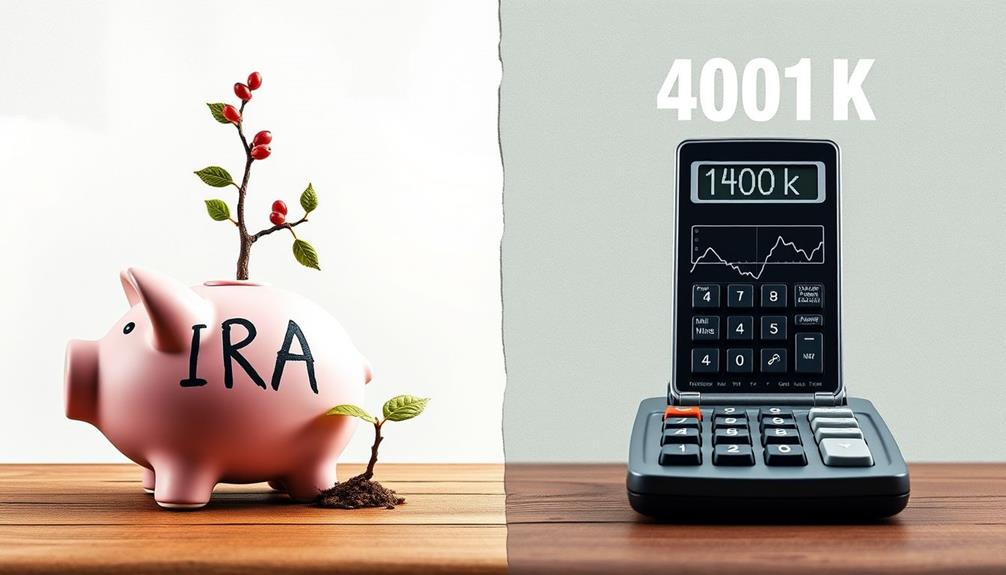To prepare your finances for a recession, start by evaluating and boosting your emergency fund to cover 3-6 months of expenses. Review your budget to cut non-essentials and manage debt, especially high-interest loans. Protect your income by updating skills and staying adaptable at work. Diversify investments and stay informed about market changes. Taking these steps now can help you weather tough times—exploring further can give you even more tools to stay secure.
Key Takeaways
- Build and maintain an emergency fund covering 3-6 months’ living expenses for financial security.
- Reduce non-essential expenses and optimize your budget to increase savings and cash flow.
- Prioritize paying off high-interest debt and avoid new borrowing to lower financial burdens.
- Diversify investments and adjust portfolios to minimize risk during economic downturns.
- Stay informed about market trends and economic indicators to adapt your financial strategies proactively.
Assess and Strengthen Your Emergency Fund

Since a recession can bring unexpected financial challenges, it’s essential to assess and strengthen your emergency fund now. Start by reviewing how much you have saved—aim for at least three to six months’ worth of living expenses. If your fund falls short, prioritize boosting it as soon as possible. Consider setting aside small, consistent amounts monthly until you reach your goal. Keep your emergency fund accessible by storing it in a liquid, safe account like a high-yield savings account. Avoid dipping into these savings for non-emergencies, and resist the urge to overreach. A solid emergency fund provides peace of mind, so you’re better prepared to handle job loss, medical expenses, or other unforeseen costs during tough economic times. Understanding financial risks associated with economic downturns can also help you plan more effectively. Additionally, being aware of liquidity management strategies ensures your funds are available when most needed without sacrificing growth potential. Regularly reviewing your cost variances can help identify areas to cut back and save more effectively during uncertain times. Incorporating a diversified savings approach can further protect your financial stability in volatile markets. To enhance your preparedness, consider exploring powerful persuasive words that can motivate disciplined saving habits.
Review and Adjust Your Budget

Have you recently reviewed your budget to identify areas where you can cut back? Now’s the time to tighten your spending. Look closely at your expenses and distinguish between essentials and non-essentials. Cancel or pause subscriptions you don’t need right now, and limit dining out or entertainment costs. Shop smarter by comparing prices and using discounts. Reevaluate your monthly bills, like utilities or insurance, to see if there are savings opportunities. Adjust your budget to prioritize savings and debt payments, ensuring you’re prepared for unexpected expenses. Tracking your spending regularly helps you stay on top of your financial goals. Remember, small changes can add up, providing you with more financial cushion during uncertain times. Incorporating Forsale 100 items into your shopping strategy can also help you save money. Staying informed about sound vibrations and their effects can motivate you to adopt more mindful spending habits that promote overall well-being. Additionally, understanding how refrigerant leaks and their impact on system efficiency can help prevent costly repairs and maintain your heat pump’s performance. Being aware of mental wellbeing indices can influence your financial decision-making, encouraging a more resilient financial mindset. Recognizing the importance of air purifier maintenance can help you avoid unnecessary replacements and keep your home environment healthy.
Manage and Reduce High-Interest Debt

After tightening your budget, it’s important to focus on reducing high-interest debt that can quickly drain your finances. High-interest debts, like credit cards, can balloon if left unchecked, making it harder to save or invest. To manage this effectively:
- Prioritize paying off the highest-interest debts first
- Consider consolidating multiple debts into a lower-interest loan
- Avoid taking on new high-interest debt
- Make extra payments whenever possible
- Negotiate with creditors for better interest rates
- Be aware of the role of generative AI in financial planning tools to identify debt reduction strategies more effectively. Additionally, understanding cheating dynamics can help in personal financial decisions by recognizing patterns of deception or misrepresentation that could impact financial trust and stability. Employing payment security measures can also prevent fraud and protect your financial assets during this process, especially as evolving cybersecurity threats increase. Staying informed about financial literacy can empower you to make smarter choices and avoid common pitfalls.
Protect Your Income and Job Security

Protecting your income and job security becomes essential during a recession, as economic downturns can lead to layoffs or reduced hours. To safeguard yourself, stay proactive by updating your skills and demonstrating your value at work. Network with colleagues and industry contacts to stay informed about opportunities. Keep your performance high and take on additional responsibilities when possible. Be transparent with your employer about your commitment and adaptability. If layoffs seem imminent, consider exploring alternative roles within your organization. Maintain an emergency fund to cover expenses if your income temporarily drops. Avoid unnecessary expenses, and be cautious with new commitments. Staying flexible and visible can improve your chances of retaining your job, even during uncertain economic times. Additionally, understanding the emotional significance of financial stability can motivate you to remain vigilant and adaptable in challenging times. Developing strong auditory processing skills can also help you better interpret financial information and make informed decisions during turbulent periods. Gaining expertise in financial literacy can further empower you to manage your resources wisely during economic fluctuations. Building a diversified investment portfolio can provide additional security against economic downturns, helping you preserve wealth and income stability.
Diversify and Safeguard Your Investments

During a recession, diversifying and safeguarding your investments becomes essential to minimize risk and preserve your financial stability. Spreading your assets across different sectors and investment types reduces the impact of a downturn in any one area. Consider reallocating funds from volatile stocks to more stable options like bonds or dividend-paying stocks. Keep an eye on your portfolio, and avoid overconcentration in a single asset class. Protect your investments by maintaining an emergency fund and avoiding high-risk ventures. Remember, resilience comes from a balanced approach. Additionally, exploring breakfast delivery options can provide comfort and convenience during challenging economic times, helping you focus on managing your finances effectively. Staying informed about market trends and utilizing investment tracking tools can further enhance your financial resilience. Incorporating insights from economic theories can help you make more informed decisions and adapt your strategies accordingly. Regularly reviewing your asset allocation ensures your investment strategy remains aligned with your risk tolerance and goals. Moreover, understanding the market cycles can help you anticipate downturns and adjust your investments proactively.
Frequently Asked Questions
How Much Should I Ideally Have in My Emergency Fund During a Recession?
You should aim to have enough in your emergency fund to cover three to six months of living expenses. During a recession, this buffer becomes even more important as job stability may decrease. Focus on saving enough to handle essential costs like rent, groceries, and utilities. If your income is unstable, consider increasing your fund to eight or even twelve months’ worth of expenses for extra security.
What Are the Best Ways to Cut Expenses Without Sacrificing Essential Needs?
You can cut expenses without sacrificing essentials by reviewing your monthly bills and identifying non-essentials to pause or cancel. Shop smarter by using coupons and buying in bulk, and consider switching to lower-cost service providers for utilities and subscriptions. Prepare meals at home instead of dining out, and limit discretionary spending like entertainment. Small changes add up, helping you save while still covering your crucial needs.
How Can I Identify and Prioritize High-Interest Debts to Pay off First?
You should start by gathering all your debt information, including interest rates and balances. Focus on identifying the debts with the highest interest rates first, as they cost you the most over time. Prioritize paying these off while maintaining minimum payments on others. Once high-interest debts are cleared, shift your focus to lower-interest ones. This strategy helps you save money and reduce debt faster.
What Strategies Can Help Protect My Income if I Work in a Vulnerable Industry?
If you work in a vulnerable industry, you should diversify your income streams to protect your finances. Consider freelancing, side gigs, or remote work opportunities to reduce reliance on your primary job. Build an emergency fund that covers at least three to six months of expenses. Keep your skills updated, network actively, and stay informed about industry shifts to adapt quickly and maintain job security during economic downturns.
Which Investment Assets Tend to Perform Best During an Economic Downturn?
During an economic downturn, you’ll find that certain investments tend to perform better. You should consider bonds, especially government bonds, as they’re usually safer. Defensive stocks like utilities and healthcare also hold up well because demand for their services remains steady. Additionally, gold often acts as a safe haven. Diversifying your portfolio to include these assets can help protect your investments when the economy slows down.
Conclusion
By taking these proactive steps, you’re better prepared to face a recession head-on. Strengthen your financial safety net, cut unnecessary expenses, and protect your income. Remember, a wise person once said, “Don’t put all your eggs in one basket.” Diversify your investments and build resilience now to weather any storm ahead. With careful planning and discipline, you can emerge stronger on the other side of economic downturns.










